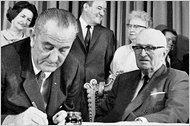The problem is not that students are spending too much time in law school. It's that they are not mastering essential skills.
« Back to Discussion
The Case Against Law School
Should the standard three years of law school, followed by the bar exam, be the only path to a legal career?
Three Years, Better Spent
Updated July 21, 2011, 08:23 PM
Bryan A. Garner is the editor in chief of "Black’s Law Dictionary," a distinguished research professor at the Dedman School of Law at Southern Methodist University, and the founder of LawProse, a consulting group.
Reforming legal education – an urgent societal need – is a glacial process. And the glacier has been flowing the wrong way. Entrenched pedagogical mediocrity infects even the best law schools, and almost all the schools simply mimic the anemic methods of the schools just above them in the rankings. But the key to better health has little to do with changing the time requirement: three years is about right.
The biggest failure at most law schools is the dearth of seriously good skills courses, especially training in legal writing. Law schools generally reward scholarship, not teaching excellence, and there is a built-in bias against one-on-one teacher-student time. Too often the only feedback a student gets from a professor is a single letter grade after the final exam. Now add this: of all law-school courses, legal writing is both the single most time-intensive subject and the least respected.
Most legal scholarship is poorly written and is mired in nonpractical abstraction that few can understand and fewer still can benefit from. Most law professors don’t know how to write well, so they could hardly teach the subject if they wanted to. On top of that, lawyers of all kinds -- both academic lawyers and practicing ones -- rationalize their linguistic ineptitude by claiming that legal jargon is necessary (most of it isn’t); that writing instruction is elementary, remedial stuff (it should progress to advanced techniques); and that writing style doesn’t matter anyway. But it does matter: clear writing equates with clear thinking, and judges and employers cry out for both. Put all these things together, and you have serious educational pathologies.
So what’s the cure? For starters, the second and third years of law school ought to include much more research, writing and editing, with three to six short papers required in each course (not, as is the standard, one “major” research paper during the whole three years). Each paper should be subjected to rigorous editing, then rewritten and resubmitted. (This is perfectly doable. I've done it for classes of 30 at the University of Texas and at Southern Methodist University.) Law schools should get their priorities straight and better meet the needs of their students’ future employers.
Short of such reform, the future for new law school graduates looks dismal. And the future of continuing-legal-education seminars for the practicing lawyers -- the kind whom I teach -- looks very bright indeed.




 George Leef, Pope Center for Higher Education Policy
George Leef, Pope Center for Higher Education Policy
 Kevin Noble Maillard, law professor, Syracuse University
Kevin Noble Maillard, law professor, Syracuse University
 Rose Cuison Villazor, Hofstra University Law School
Rose Cuison Villazor, Hofstra University Law School
 David Lat, editor, Above the Law
David Lat, editor, Above the Law
 Geoffrey R. Stone, University of Chicago Law School
Geoffrey R. Stone, University of Chicago Law School
 Bryan A. Garner, editor in chief, “Black’s Law Dictionary"
Bryan A. Garner, editor in chief, “Black’s Law Dictionary"

 Presidents and Their Debts, F.D.R. to Bush
Presidents and Their Debts, F.D.R. to Bush
 Can World Soccer Root Out Corruption?
Can World Soccer Root Out Corruption?
 What Will the Debt Debate Mean for 2012?
What Will the Debt Debate Mean for 2012?
 The Texas Jobs Juggernaut
The Texas Jobs Juggernaut
 Women's Choices: School vs. Children
Women's Choices: School vs. Children
7 Readers' Comments
Post a comment »You must be joking.
-------
The MBAs got a lot of help with the biglaw lawyers. The Bank of America CEO is a securities lawyer.
Who do you think are the clients of the entry-level lawyers who make $160k a year? the middle class?
Many of the people going into law school today are aspiring to work in mergers and acquisitions, securities law, etc. so that the MBAs can package more mortgage-backed derivatives.
Why do you think it has been so hard to indict anyone responsible for our financial crisis?
Law school can be reduced to two years for those who prepare by taking appropriate law related undergraduate courses and more time should be devoted to apprenticeships, as done in the U.K. and Canada. I took a trial advocacy course taught by a judge, who later rose to Justice on the Illinois Supreme Court, but he did not teach me as much as I learned in 6 months of actual trial practice with an attorney, who herself later ascended to the bench.
Learning the law through the Socratic method can be started at the undergraduate level. Law school can be more accessible through restructuring the LSAT to eliminate racial and cultural biases and eliminating the ABA monopoly on accreditation of law schools. California allows students from non-ABA accredited schools to take the state bar exam. Restriction of the availability of legal education keeps tuition artificially high and like other monopolies should be eliminated to allow the market to determine the costs.
When I began my 22 year career as an Assistant Public Defender for Cook County, I was hired by an outstanding advocate with only 1 year of law school, which was all that was required at the time that he took the bar exam, shortly after World War II. He only completed his law degree years later. Under current criteria, he would never had been allowed to practice law.
Log In to Post a Comment